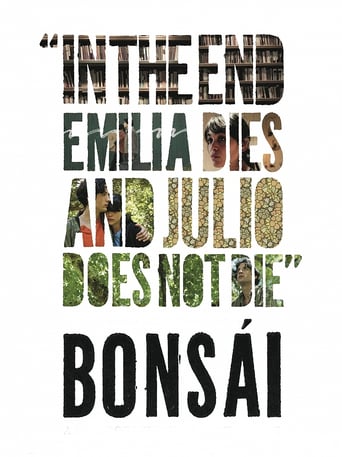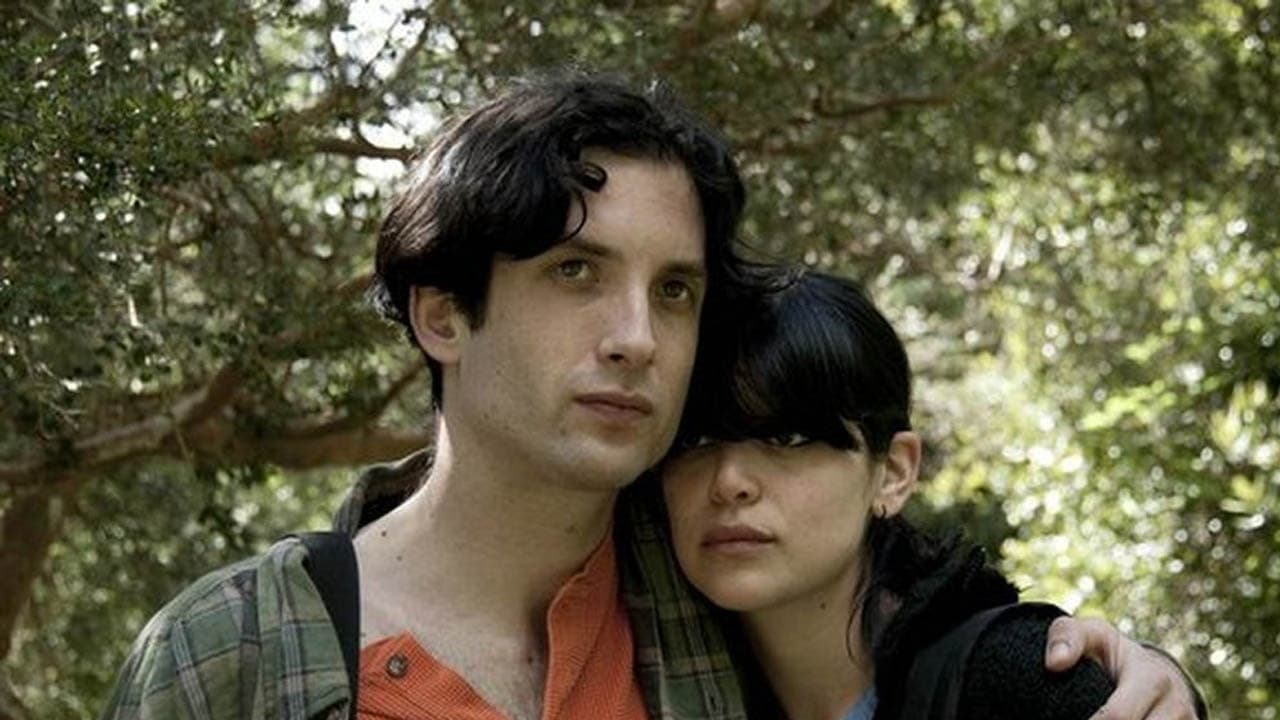Armand
a film like a spring wind. hot, perfumed, not very power, hided in grass and leaves. or memories and love. it is not exactly a great movie but it is bitter-refreshing. and that virtue is important in its case. because beyond words, a book and a small tree , the dreams, intentions, gestures and revelations, in almost childish - delicate manner are good opportunity for remind one of profound roles of cinema - to discover and open windows. the key is not the story, the atmosphere or image. but the lead actor who gives to film a special aura. and precise equilibrium. a film as a state of soul. who reminds old images and use well known symbols .realistic for the its vision about basic life aspects. seductive for the skin of trip between past and present. and for poetic flavor who saves, always, everything. because it is the film of a book and a bonsai.
jm10701
Bonsái is a very, VERY low-key comedy plus dreamy meditation on the nature of memory and of literature - and of bonsai - admittedly NOT most movie-goers' cup of tea. The only action is fairly frequent sex, but even that is more drolly amusing and detached than either erotic or romantic.The central place Marcel Proust's Remembrance of Things Past occupies in this movie is no accident (the current fad is to translate Proust's French title as In Search of Lost Time, which is literal but moronic). The theme, the tone, the focus, the slow flow with strong but intangible undercurrents of this extraordinary movie are as true a filming of Proust's unfilmable 5000-page masterpiece as we're likely ever to see.Bonsái could not have been made without Diego Noguera in the lead as Julio. His exquisite grace, charm, humor and intelligence permeate the whole movie, and viewers to whom he does not appeal will be left cold and annoyed.If you love the movie, as I do, it's because of Noguera. Cristián Jiménez certainly deserves great credit for constructing such a remarkable movie, but with any other actor in the key role it would have fallen flat.
cowboyandvampire
Bonsai is a sweet, sad and highly relatable Chilean love story about a lost young man, an aspiring novelist, who casually lies, passionately reads and – at least as an adult – idly romances his way through life. After telling his current lover he is transcribing a novel written in long-hand by a famous author, they bond more deeply over the process.To nurture that lie, and to give his own life some structure and purpose, he begins forging a copy – on the same notebooks and complete with coffee stains and cigarette ashes. His writing is clumsy at first, probably due to the fact that he has little experience to draw from, until he starts retelling his first love, with a beautiful free spirited girl.In a series of flashbacks, he remembers their meeting, their long romance, the passion and the lounging about reading and enjoying each other. That energy is channeled into the fake novel and his present day life is re-energized. Of course, we all know the first love doesn't survive and we travel back and forth in time to learn why, to watch as his current relationship slowly evolves and to find out if it is possible to recapture that youthful fervor as a more experienced – and more disappointed and disillusioned – adult.The bonsai, of course, is symbolic of the past relationship and his current aimlessness (no accident that the plant is not deeply rooted and exists as a carefully sculpted miniature of real life). It sounds corny, and ham-fisted, but works surprisingly well and while potted plants figure largely throughout, the bonsai itself is actually more of a breakthrough that adds a sliver of hope, albeit with tiny, tiny limbs.
jsrvm
BonsaiLike the gentle life of a bonsai plant, the love of Julio and Emilia grows slowly, survives delicately, and eventually, dies quietly. Director/writer Cristian Jimenez tells the mildly humorous story of the young Chilean couple's first relationship which sustained by literature, sex, and a complacent enjoyment of one another's presence as the days slowly drag on.Julio, a monotonous yet thoughtful university student first catches Emilia's eye at a small party in their seemingly motionless Chilean town. It seems that the time they first hook up is almost completely out of boredom, as the party is dying down, and they simply have nothing better to do. This passionless, comedic hookup leads to a playful, albeit sedated relationship that revolves around sex and literature.Jimenez uses a consistent, 8-year flashback and flash-forward from Julio's college life with Emilia to his adult life as a struggling, very much alone writer. Julio remains a static character throughout his life in terms of his passive, sarcastic demeanor as well as his tendency to constantly tell lies.Julio's lies are not serious, though they always catch up with him, undermining his relationship with Emilia as well as his ability to connect with those around him. Julio's first lie is in class, when a literature professor asks all the students who had done the assigned reading to raise their hands. As students slowly raise their hands surrounding him, Julio cluelessy gazes around and meekly raises his hand. This first, awkward and hilarious lie shows how Julio chooses the path of least resistance and foreshadows his future passionless relationship with Emilia.Julio's tendency to lie follows him into adult hood. He makes an offer to transcribe the novel of a well-established author, Gazmuri, onto the computer but is rejected, as his price is too high. He needlessly tells his current partner and neighbor, Blanca, that he had received the job. He begins writing his own novel by hand and for some reason, transcribes it to the computer when he is around Blanca. He titles the novel Bonsai, by Gazmuri, a loose autobiography of his past relationship with Emila. For some odd reason, he goes so far as to change his style of writing to cursive and to purposely spill tea and cigarettes on his notebooks in order to feign the authenticity of the journals.The story is riddled with literary references as well as an on going bonsai plant theme, which acts as a metaphor for the relationship that Julio and Emilia share as college students. In Julio's novel, he blatantly compares a relationship to a bonsai plant in a number of ways. To grow a bonsai, one must tie down the plant's branches in order to imitate the weight of snow in nature. The mildly depressing comparison is drawn to his own past relationship with Emilia, in which the two unceremoniously tied themselves down and took on each other's burden in order to remain together.Julio also makes a more cheerful and meaningful metaphor regarding the bonsai plant: once a bonsai plant is removed from its pot, it will no longer be a bonsai, but will grow like a normal plant. The connection here is that in order for a relationship to last, it must have a strong foundation. For Julio and Emilia, their relationship actually begun when they both found out they shared a strong love of literature. Unfortunately for them, they discovered this by both lying about having read a book by Proust, in order to seem like authentic literati. Despite quiet hilarity of them both attempting to discuss the pros and cons of a book that neither of them has read, this small lie along with a few others results in the eventual demise of their tender relationship.The overall message of Julio's story is quite complex and meaningful though possibly too complex some. Many of the countless references went right over my own head, though the more learned members of the audience definitely enjoyed the esoteric, literary jokes and metaphors and were laughing right along at key moments. Bonsai is obviously a must for bibliophiles, and despite catering to a select audience, overall, the story is quite attractive nonetheless, is edited and shot beautifully, and is an honest and fascinating look at first love lost. The story does roll out slowly, so be ready for a leisurely look at Julio's life.



 AD
AD

